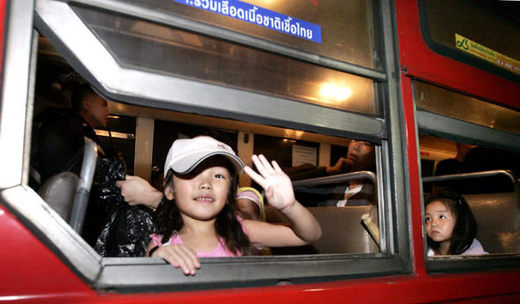 |
|
A child of a North Korean defector waves on a bus bound for an immigration detention center on August 22. Bangkok=Reuter Yonhap
|
Seoul wants ’quiet solution’ to quell ire from North
The Korean and United States governments are moving quickly to respond to the arrest of 175 North Korean defectors in Thailand. Foreign minister Ban Ki-moon said Wednesday that Korea is talking to the Thai government as it decides how to handle the situation. United States assistant secretary of state for the Bureau of Population, Refugees and Migration Ellen Sauerbrey is touring Thailand, Malaysia, and Bangladesh from August 21 to September 2 to discuss refugee issues in the region, including ways to help North Korean defectors through the office of the United Nations High Commissioner for Refugees (UNHCR). Radio Free Asia, quoting the UN high commissioner’s office, said Tuesday that high commissioner Antonio Guterres will join Sauerbrey as she visits Thailand. The broadcast quoted a high-ranking U.S. State Department official as saying the two will discuss ways for utilizing the UNHCR in assisting North Korean defectors in Southeast Asia. The high-ranking official was quoted as saying that the UNHCR will contact U.S. authorities whenever there are North Koreans seeking to settle in America, and that the U.S. is very actively involved in bilateral discussions with various Southeast Asian nations about North Koreans currently in the region. The detention of 175 North Koreans in Thailand is notable for two reasons. To begin with there is the sheer size of the group that has been arrested. This is the first time as many as 175 North Koreans have been caught at the same location. In terms of size, the only available comparison would be the 468 North Koreans who arrived in South Korea on two flights from Vietnam on July 27 and 28, 2004. At the time, North Korea’s foreign ministry declared that it would "not overlook the fact that Vietnam conspired" with the South to help the refugees get to Seoul, and the North’s Committee for the Peaceful Reunification of the Fatherland called it "a crime of anti-Korean terrorist kidnapping" that it would "never stand by and watch." Indeed, the simultaneous arrival of so many defectors in Seoul led to serious effects on inter-Korean relations, including cancellation of a Southern delegation’s visit to Pyongyang to mark the tenth anniversary of the death of Kim Il-sung, as well as the postponement of ministerial-level talks scheduled for August of that year. Hoping to avoid the same diplomatic fallout, the South Korean government appears to trying to find a "quiet solution" rather than the same kind of "mass arrival" that occurred in 2004. Another question the arrests raise is why so many defectors are turning up in Thailand. One reason would be the ongoing crackdown on defectors in China because of Chinese authorities’ concerns about relations with North Korea and security in its three northeastern provinces. People working to assist defectors say that in recent years they have been using Mongolia, to China’s north, or going from the southern Chinese city of Kunming to cross over the Mekong River into the northern Thai city of Chiang Mai. In an interview with Radio Free Asia in November of last year, Kim Jun-hwan, a Christian missionary working with North Korean refugees, said that defectors caught in Laos and Burma frequently get sent back to China, but that when they are caught in Thailand they are sent to Thai immigration detention centers. According to the South Korean Unification Ministry, as of the end of July, 1,054 North Korean defectors have arrived in the South so far this year, 59 percent more than last year. A total of 8,741 defectors have settled in South Korea since the North and South were divided along the DMZ at the end of the Korean War in 1953.





